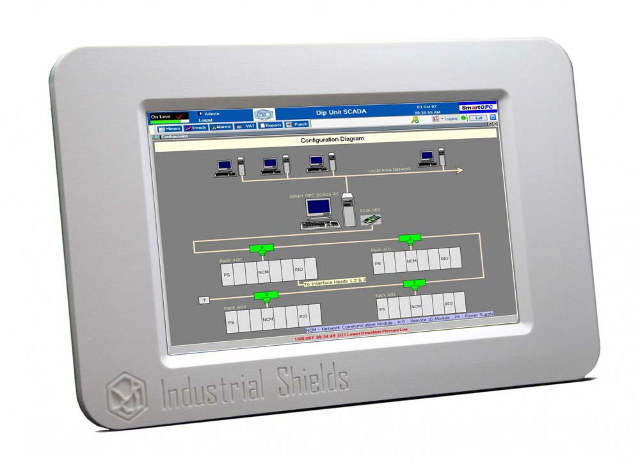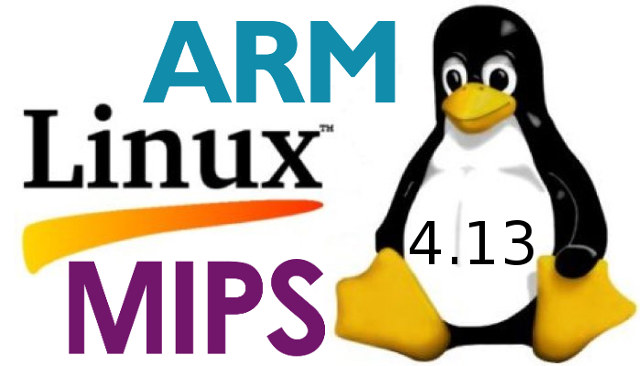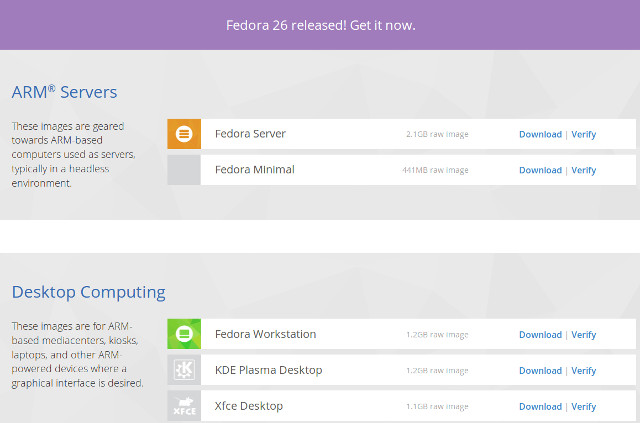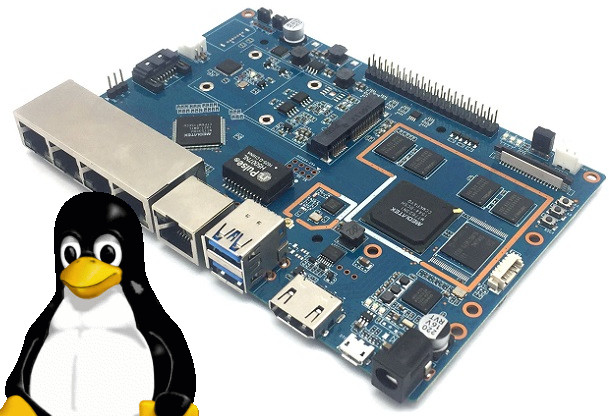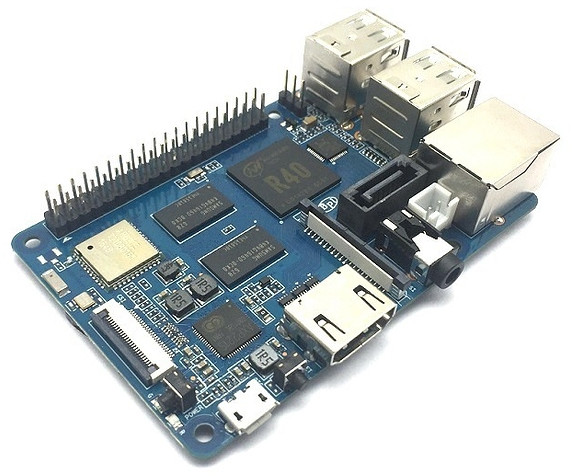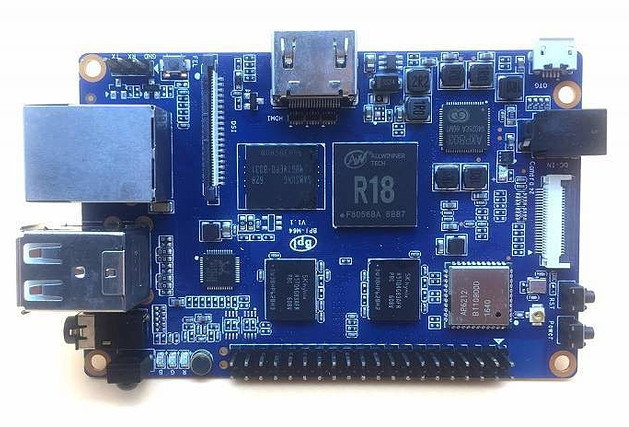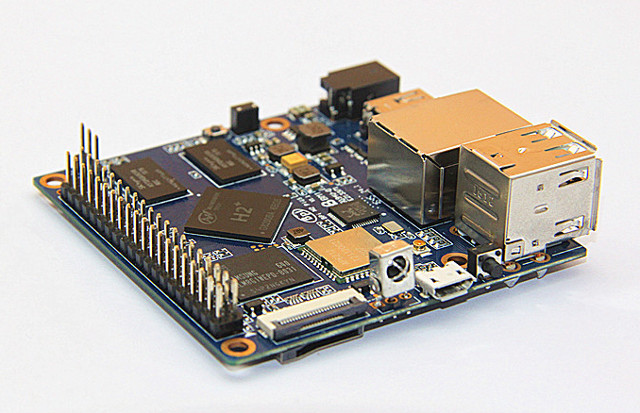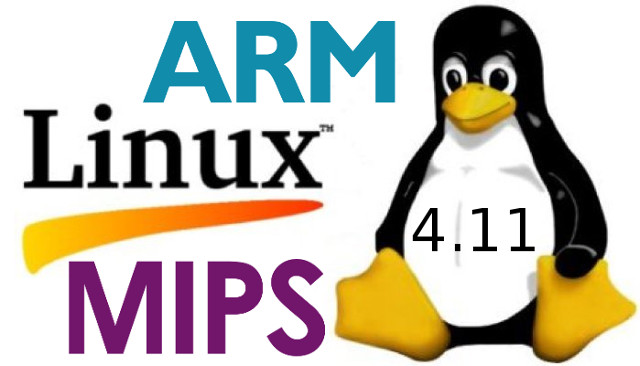Boot&Work Corp., S.L. is a company based in Catalonia that sells industrial automation electronic devices under “Industrial Shields” brand. What makes their product noticeable is that they all appear to be based on maker boards such as Arduino or Raspberry Pi. The company offers various Arduino based PLC modules with or without Ethernet that can be controlled with 10.1″ industrial grade panel PCs based on ARM Linux development boards. Currently three sub-families are available: HummTOUCH powered by Solidrun HummingBoard-i2 NXP i.MX 6Dual Lite board BANANATOUCH with either Banana Pi M64 (Allwinner A64 quad core Cortex A53) or Banana Pi M3 (Allwinner A83T octa core Cortex A7) TOUCHBERRY with Raspberry Pi model B or Raspberry Pi 3 model B Beside the different processors, the 10.1″ Panel PCs share some of the same specifications: Display – 10.1″ resistive multitouch LVDS, 315 nits, 170° viewing angle, 1280×720 resolution Video Input – MIPI CSI […]
Linux 4.13 Release – Main Changes, ARM & MIPS Architectures
Linus Torvalds has just announced the release of Linux 4.13 and a kidney stone…: So last week was actually somewhat eventful, but not enough to push me to delay 4.13. Most of the changes since rc7 are actually networking fixes, the bulk of them to various drivers. With apologies to the authors of said patches, they don’t look all that interesting (which is definitely exactly what you want just before a release). Details in the appended shortlog. Note that the shortlog below is obviously only since rc7 – the _full_4.13 log is much too big to post and nobody sane would read it. So if you’re interested in all the rest of it, get the git tree and limit the logs to the files you are interested in if you crave details. No, the excitement was largely in the mmu notification layer, where we had a fairly last-minute regression and […]
Fedora 26 Supports Single “Unified” OS Images for Multiple ARM Platforms
The decision to use device tree in Linux occurred several years ago, after Linus Torvalds complained that Linux on ARM was a mess, with the ultimate goal of providing a unified ARM kernel for all hardware. Most machine specific board files in arch/arm/mach-xxx/ are now gone from the Linux kernel, being replaced by device tree files, and in many case you simply need to replace the DTB (Device Tree Binary) file from an operating system to run on different hardware platforms. However, this is not always that easy as U-boot still often differ between boards / devices, so it’s quite frequent to distribute different firmware / OS images per board. Fedora has taken another approach, as the developers are instead distributing a single Fedora 26 OS ARMv7 image, together with an installation script. Images for 64-bit ARM (Aarch64) are a little different since they are designed for SBSA compliant servers, so […]
Banana Pi BPI-R2’s U-boot & Linux 4.4 Source Code & MediaTek MT7623N Datasheet Released
Banana Pi BPI-R2 is a multimedia router board powered by MediaTek MT7623N quad core processor with 2GB RAM, 5 Gigabit Ethernet ports, up to two SATA ports, two USB 3.0 ports, HDMI output, and I/O headers. The board is not for sale yet, but the company has recently released the source code with U-boot and Linux 4.4.70, as well as a datasheet for MediaTek MT7623N processor. The source code can be found on Github, so let’s see if we can build it:
|
1 2 3 4 5 6 7 8 9 10 11 12 13 14 15 16 17 18 19 20 21 22 23 |
git clone https://github.com/BPI-SINOVOIP/BPI-R2-bsp cd BPI-R2-bsp/ sudo apt install gcc-arm-linux-gnueabihf ./build.sh ./build.sh NOTICE: new build.sh default select BPI-R2-720P and pack all boards supported boards: BPI-R2-720P BPI-R2-720P configured. Now run `make` This tool support following building mode(s): -------------------------------------------------------------------------------- 1. Build all, uboot and kernel and pack to download images. 2. Build uboot only. 3. Build kernel only. 4. kernel configure. 5. Pack the builds to target download image, this step must execute after u-boot, kernel and rootfs build out 6. update files for SD 7. Clean all build. -------------------------------------------------------------------------------- Please choose a mode(1-7): 1 |
After a couple of minutes, the build would end with:
|
1 2 3 4 5 |
usr/lib/u-boot/bananapi/ usr/lib/u-boot/bananapi/bpi-r2/ usr/lib/u-boot/bananapi/bpi-r2/BPI-R2-720P-2k.img.gz Build success! |
For the very last step, it asks you to login as root / sudoer, which it should not do… But we end up with the images, so at least it builds:
|
1 2 3 4 5 6 7 8 |
ls -lh ./SD/ total 27M drwxrwxr-x 2 jaufranc jaufranc 4.0K Jun 28 10:46 100MB -rw-rw-r-- 1 jaufranc jaufranc 22M Jun 28 10:46 4.4.70-BPI-R2-Kernel.tgz -rw-rw-r-- 1 jaufranc jaufranc 151K Jun 28 10:46 BOOTLOADER-bpi-r2.tgz drwxrwxr-x 3 jaufranc jaufranc 4.0K Jun 28 10:46 BPI-BOOT -rw-rw-r-- 1 jaufranc jaufranc 4.8M Jun 28 10:46 BPI-BOOT-bpi-r2.tgz drwxrwxr-x 4 jaufranc jaufranc 4.0K Jun 28 10:46 BPI-ROOT |
MediaTek has also been active by committing patchsets for MT7623 to the Linux Kernel Mailing List, so mainline Linux is an eventual possibility for […]
Banana Pi BPI-M2 Berry Allwinner V40 Development Board, Allwinner Business Units & SDK/Software Management
SinoVoIP has unveiled yet another new board with Banana Pi BPI-M2 Berry this week-end. It’s actually quite similar to Banana Pi BPI-M2 Ultra board, by they replaced Allwinner R40 with Allwinner V40 processor, removed some features, and use Raspberry Pi 3 form factor. If we look at Allwinner V40 product brief we can see the specifications look almost identical, with V40 potentially exposing an extra CAN bus. The company’s announcement was very confusing since they show Banana Pi BPI-M2 Berry board with Allwinner R40 instead of Allwinner V40. Banana Pi BPI-M2 Berry Banana Pi BPI-M2 Berry specifications: SoC – Allwinner V40 quad Core ARM Cortex A7 processor with ARM Mali-400MP2 GPU System Memory – 1G DDR3 SDRAM Storage – micro SD slot, SATA interface Connectivity – 1x Gigabit Ethernet port, 802.11 b/g/n WiFi and Bluetooth 4.0 (AP6212 module) Video Output – HDMI 1.4 port up to 1080p60, 4-lane MIPI DSI […]
Banana Pi BPI-M64 Board Gets Allwinner R18 Processor with Google Cloud IoT Core Support
Banana Pi BPI-M64 board was launched with Allwinner A64 processor, but a few days ago, I noticed the board got an option for Allwinner R18. Both processors are likely very similar since they are pin-to-pin compatible, and Pine64 was first seen with Allwinner R18, so I did not really feel it was newsworthy. But today, Google announced Google Cloud IoT Core cloud service working with a few app partners such as Helium and Losant, as well as several device partners including ARM, Marvell, Microchip, Mongoose OS, NXP… and Allwinner, having just announced the release of an Allwinner R18 SDK with libraries supporting Google Cloud IoT Core. Let’s go through the board specifications first which are exactly the same as for the original BPI-M64 board, except for the processor: SoC – Allwinner R18 quad core ARM Cortex A53 processor with Mali-400MP2 GPU System Memory – 2GB DDR3 Storage – 8GB eMMC […]
SinoVoIP Releases $35 Banana Pi BPI-M2+ Board with Allwinner H2+ Processor
Banana Pi BPI M2+ board was first released with Allwinner H3 processor, but the same PCB can also be used with Allwinner H2+ and H5 processors since the processors are pin-to-pin compatible, and SinoVoIP intends to release three version of the board, and just launched BPI M2+ (aka BPI H2+) with Allwinner H2+ processor for $34.50 + shipping, $1.5 cheaper than the H3 version also listed on Aliexpress. If you shop around, and don’t order on the official SinoVoIP store, you may find cheaper price for the boards. As expected, the specifications have not changed apart from the processor: SoC – Allwinner H2+ quad core Cortex A7 @ 1.2 GHz with an ARM Mali-400MP2 GPU up to 600 MHz System Memory – 1GB DDR3 Storage – 8GB eMMC flash, micro SD card slot up to 64GB, Video & Audio Output – HDMI with CEC support Connectivity – Gigabit Ethernet, 802.11 […]
Linux 4.11 Release – Main Changes, ARM & MIPS Architecture
Linus Torvalds has just released Linux 4.11: So after that extra week with an rc8, things were pretty calm, and I’m much happier releasing a final 4.11 now. We still had various smaller fixes the last week, but nothing that made me go “hmm..”. Shortlog appended for people who want to peruse the details, but it’s a mix all over, with about half being drivers (networking dominates, but some sound fixlets too), with the rest being some arch updates, generic networking, and filesystem (nfs[d]) fixes. But it’s all really small, which is what I like to see the last week of the release cycle. And with this, the merge window is obviously open. I already have two pull request for 4.12 in my inbox, I expect that overnight I’ll get a lot more. Linux 4.10 added Virtual GPU support, perf c2c’ tool, improved writeback management, a faster initial WiFi connection […]


